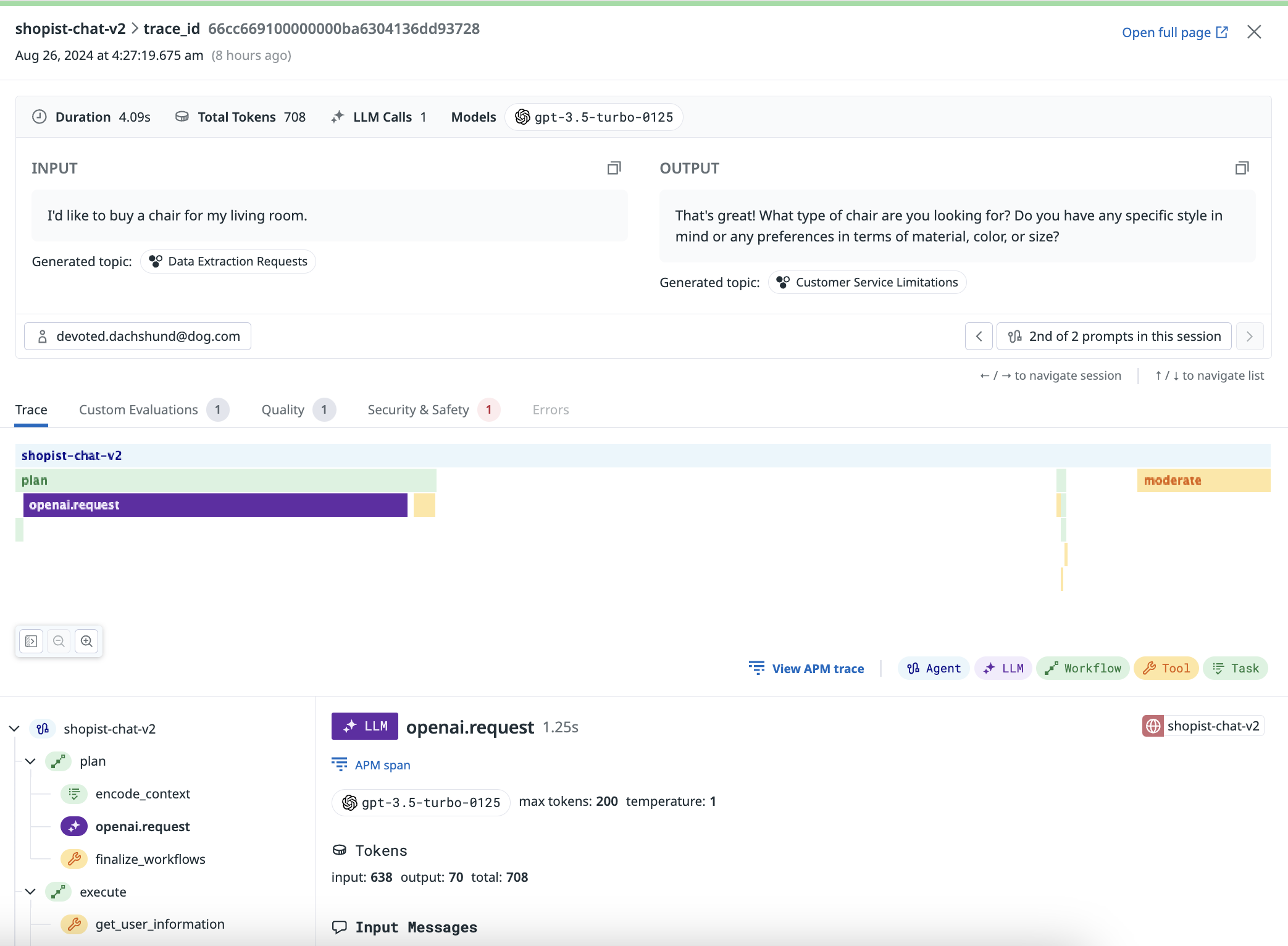- Essentials
- Getting Started
- Datadog
- Datadog Site
- DevSecOps
- Serverless for AWS Lambda
- Agent
- Integrations
- Containers
- Dashboards
- Monitors
- Logs
- APM Tracing
- Profiler
- Tags
- API
- Software Catalog
- Session Replay
- Synthetic Monitoring and Testing
- Incident Management
- Database Monitoring
- Cloud Security Management
- Cloud SIEM
- Application Security Management
- Workflow Automation
- Software Delivery
- Code Security
- Learning Center
- Support
- Glossary
- Standard Attributes
- Guides
- Agent
- Integrations
- Developers
- Authorization
- DogStatsD
- Custom Checks
- Integrations
- Create an Agent-based Integration
- Create an API Integration
- Create a Log Pipeline
- Integration Assets Reference
- Build a Marketplace Offering
- Create a Tile
- Create an Integration Dashboard
- Create a Monitor Template
- Create a Cloud SIEM Detection Rule
- OAuth for Integrations
- Install Agent Integration Developer Tool
- Service Checks
- IDE Plugins
- Community
- Guides
- OpenTelemetry
- Administrator's Guide
- API
- Datadog Mobile App
- CoScreen
- CoTerm
- Cloudcraft
- In The App
- Dashboards
- Notebooks
- DDSQL Editor
- Reference Tables
- Sheets
- Monitors and Alerting
- Metrics
- Watchdog
- Bits AI
- Software Catalog
- Error Tracking
- Change Tracking
- Service Management
- Actions & Remediations
- Infrastructure
- Resource Catalog
- Universal Service Monitoring
- Hosts
- Containers
- Processes
- Serverless
- Network Monitoring
- Cloud Cost
- Application Performance
- APM
- Continuous Profiler
- Database Monitoring
- Agent Integration Overhead
- Setup Architectures
- Setting Up Postgres
- Setting Up MySQL
- Setting Up SQL Server
- Setting Up Oracle
- Setting Up Amazon DocumentDB
- Setting Up MongoDB
- Connecting DBM and Traces
- Data Collected
- Exploring Database Hosts
- Exploring Query Metrics
- Exploring Query Samples
- Exploring Recommendations
- Troubleshooting
- Guides
- Data Streams Monitoring
- Data Jobs Monitoring
- Digital Experience
- Real User Monitoring
- Product Analytics
- Synthetic Testing and Monitoring
- Continuous Testing
- Software Delivery
- CI Visibility
- CD Visibility
- Test Optimization
- Quality Gates
- DORA Metrics
- Security
- Security Overview
- Cloud SIEM
- Cloud Security Management
- Application Security Management
- Sensitive Data Scanner
- Code Security
- AI Observability
- Log Management
- Observability Pipelines
- Log Management
- Administration
Trace An LLM Application
LLM Observability is not available in the selected site () at this time.
Overview
This guide uses the LLM Observability SDKs for Python and Node.js. If your application is written in another language, you can create traces by calling the API instead.
Setup
Jupyter notebooks
To better understand LLM Observability terms and concepts, you can explore the examples in the LLM Observability Jupyter Notebooks repository. These notebooks provide a hands-on experience, and allow you to apply these concepts in real time.
Command line
To generate an LLM Observability trace, you can run a Python or Node.js script.
Prerequisites
- LLM Observability requires a Datadog API key. For more information, see the instructions for creating an API key.
- The following example script uses OpenAI, but you can modify it to use a different provider. To run the script as written, you need:
- An OpenAI API key stored in your environment as
OPENAI_API_KEY. To create one, see Account Setup and Set up your API key in the official OpenAI documentation. - The OpenAI Python library installed. See Setting up Python in the official OpenAI documentation for instructions.
- An OpenAI API key stored in your environment as
Install the SDK and OpenAI packages:
pip install ddtrace pip install openaiCreate a script, which makes a single OpenAI call.
import os from openai import OpenAI oai_client = OpenAI(api_key=os.environ.get("OPENAI_API_KEY")) completion = oai_client.chat.completions.create( model="gpt-3.5-turbo", messages=[ {"role": "system", "content": "You are a helpful customer assistant for a furniture store."}, {"role": "user", "content": "I'd like to buy a chair for my living room."}, ], )Run the script with the following shell command. This sends a trace of the OpenAI call to Datadog.
DD_LLMOBS_ENABLED=1 DD_LLMOBS_ML_APP=onboarding-quickstart \ DD_API_KEY=<YOUR_DATADOG_API_KEY> DD_SITE=<YOUR_DD_SITE> \ DD_LLMOBS_AGENTLESS_ENABLED=1 ddtrace-run python quickstart.pyReplace
<YOUR_DATADOG_API_KEY>with your Datadog API key, and replace<YOUR_DD_SITE>with your Datadog site.For more information about required environment variables, see the SDK documentation.
Install the SDK and OpenAI packages:
npm install dd-trace npm install openaiCreate a script, which makes a single OpenAI call.
const { OpenAI } = require('openai'); const oaiClient = new OpenAI(process.env.OPENAI_API_KEY); function main () { const completion = await oaiClient.chat.completions.create({ model: 'gpt-3.5-turbo', messages: [ { role: 'system', content: 'You are a helpful customer assistant for a furniture store.' }, { role: 'user', content: 'I\'d like to buy a chair for my living room.' }, ] }); } main();Run the script with the following shell command. This sends a trace of the OpenAI call to Datadog.
DD_LLMOBS_ENABLED=1 DD_LLMOBS_ML_APP=onboarding-quickstart \ DD_API_KEY=<YOUR_DATADOG_API_KEY> DD_SITE=<YOUR_DD_SITE> \ DD_LLMOBS_AGENTLESS_ENABLED=1 NODE_OPTIONS="--import dd-trace/initialize.mjs" node quickstart.jsReplace
<YOUR_DATADOG_API_KEY>with your Datadog API key, and replace<YOUR_DD_SITE>with your Datadog site.For more information about required environment variables, see the SDK documentation.
Note: DD_LLMOBS_AGENTLESS_ENABLED is only required if you do not have the Datadog Agent running. If the Agent is running in your production environment, make sure this environment variable is unset.
View the trace of your LLM call on the Traces tab of the LLM Observability page in Datadog.
The trace you see is composed of a single LLM span. The ddtrace-run or NODE_OPTIONS="--import dd-trace/initialize.mjs" command automatically traces your LLM calls from Datadog’s list of supported integrations.
If your application consists of more elaborate prompting or complex chains or workflows involving LLMs, you can trace it using the Setup documentation and the SDK documentation.
Further Reading
Additional helpful documentation, links, and articles:

